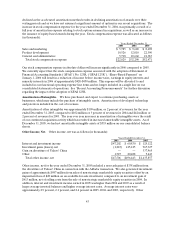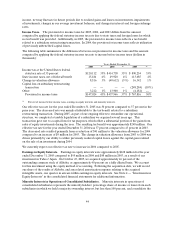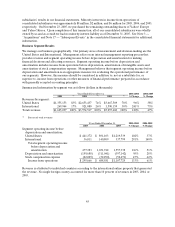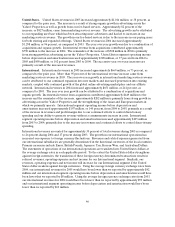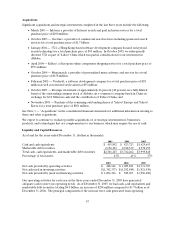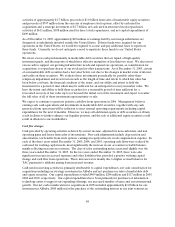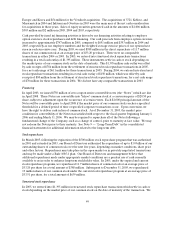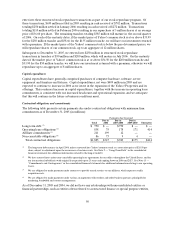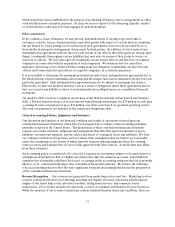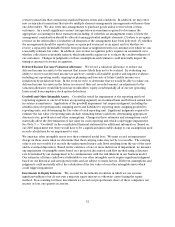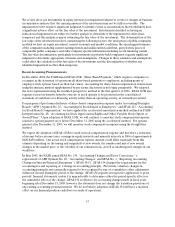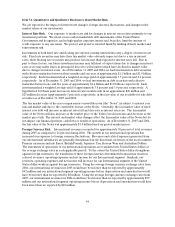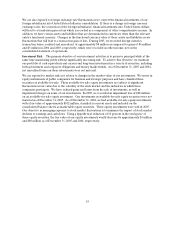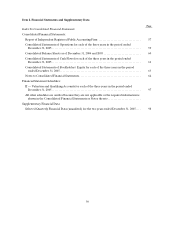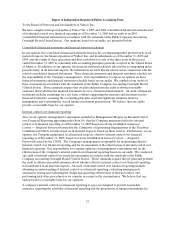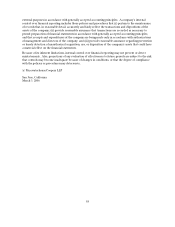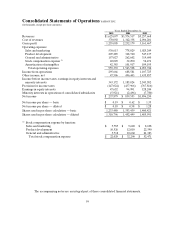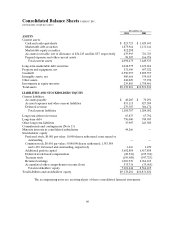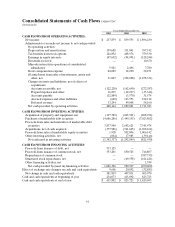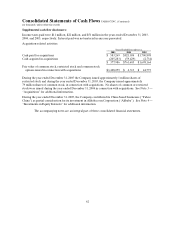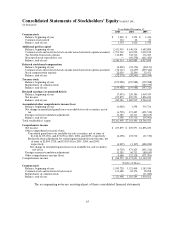Yahoo 2005 Annual Report Download - page 59
Download and view the complete annual report
Please find page 59 of the 2005 Yahoo annual report below. You can navigate through the pages in the report by either clicking on the pages listed below, or by using the keyword search tool below to find specific information within the annual report.53
We review all of our investments in equity interests for impairment whenever events or changes in business
circumstances indicate that the carrying amount of the investment may not be fully recoverable. The
impairment review requires significant judgment to identify events or circumstances that would likely have
a significant adverse effect on the fair value of the investment. Investments identified as having an
indication of impairment are subject to further analysis to determine if the impairment is other-than-
temporary and this analysis requires estimating the fair value of the investment. The determination of the
fair value of the investment involves considering the following factors: the stock prices of public companies
in which we have an equity investment, current economic and market conditions, the operating performance
of the companies including current earnings trends and undiscounted cash flows, quoted stock prices of
comparable public companies, and other company specific information including recent financing rounds.
The fair value determination, particularly for investments in privately-held companies, requires significant
judgment to determine appropriate estimates and assumptions. Changes in these estimates and assumptions
could affect the calculation of the fair value of the investments and the determination of whether any
identified impairment is other-than-temporary.
Recent Accounting Pronouncements
In December 2004, the FASB issued SFAS 123R, “Share-Based Payment,” which requires companies to
recognize in the statement of operations all share-based payments to employees, including grants of
employee stock options, based on their fair values. Accounting for share-based compensation transactions
using the intrinsic method supplemented by pro forma disclosures is no longer permissible. We adopted
the new requirements using the modified prospective method in the first quarter of 2006. SFAS 123R also
requires excess tax benefits from the exercise of stock options to be presented in the consolidated
statement of cash flows as a financing activity rather than an operating activity, as currently presented.
For purposes of pro forma disclosure of share-based compensation expense under Accounting Principles
Board (“APB”) Opinion No. 25, “Accounting for Stock Issued to Employees,” and SFAS 123, “Accounting
for Stock-Based Compensation,” we have applied the accelerated amortization method outlined in FASB
Interpretation No. 28, “Accounting for Stock Appreciation Rights and Other Variable Stock Option or
Award Plans.” Upon adoption of SFAS 123R, we will continue to amortize stock compensation expense
related to options granted on or before December 31, 2005 using the accelerated method. For options
granted after December 31, 2005, we will amortize stock compensation expense using the straight-line
method.
We expect the adoption of SFAS 123R to result in stock compensation expense and therefore a reduction
of income before income taxes, earnings in equity interests and minority interests in 2006 of approximately
$420-$450 million. Our actual stock compensation expense amount could differ materially from this
estimate depending on the timing and magnitude of new awards, the number and mix of new awards,
changes in the market price or the volatility of our common stock, as well as unanticipated changes in our
workforce.
In May 2005, the FASB issued SFAS No. 154, “Accounting Changes and Error Corrections,” a
replacement of APB Opinion No. 20, “Accounting Changes” and SFAS No. 3, “Reporting Accounting
Changes in Interim Financial Statements” (“SFAS 154”). SFAS 154 changes the requirements for the
accounting for and reporting of, a change in accounting principle. Previously, voluntary changes in
accounting principles were generally required to be recognized by way of a cumulative effect adjustment
within net income during the period of the change. SFAS 154 requires retrospective application to prior
periods’ financial statements, unless it is impracticable to determine either the period-specific effects or
the cumulative effect of the change. SFAS 154 is effective for accounting changes made in fiscal years
beginning after December 15, 2005; however, the statement does not change the transition provisions of
any existing accounting pronouncements. We do not believe adoption of SFAS 154 will have a material
effect on our financial position, cash flows or results of operations.


